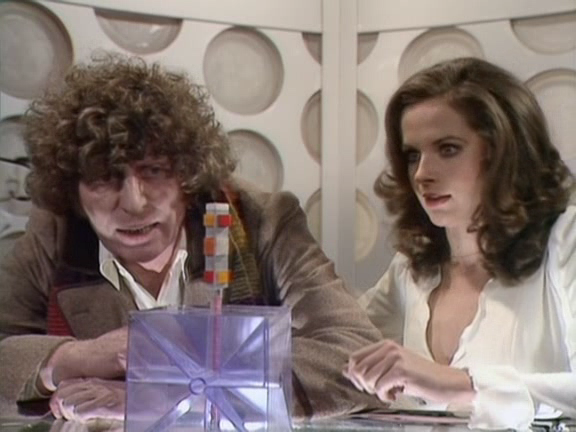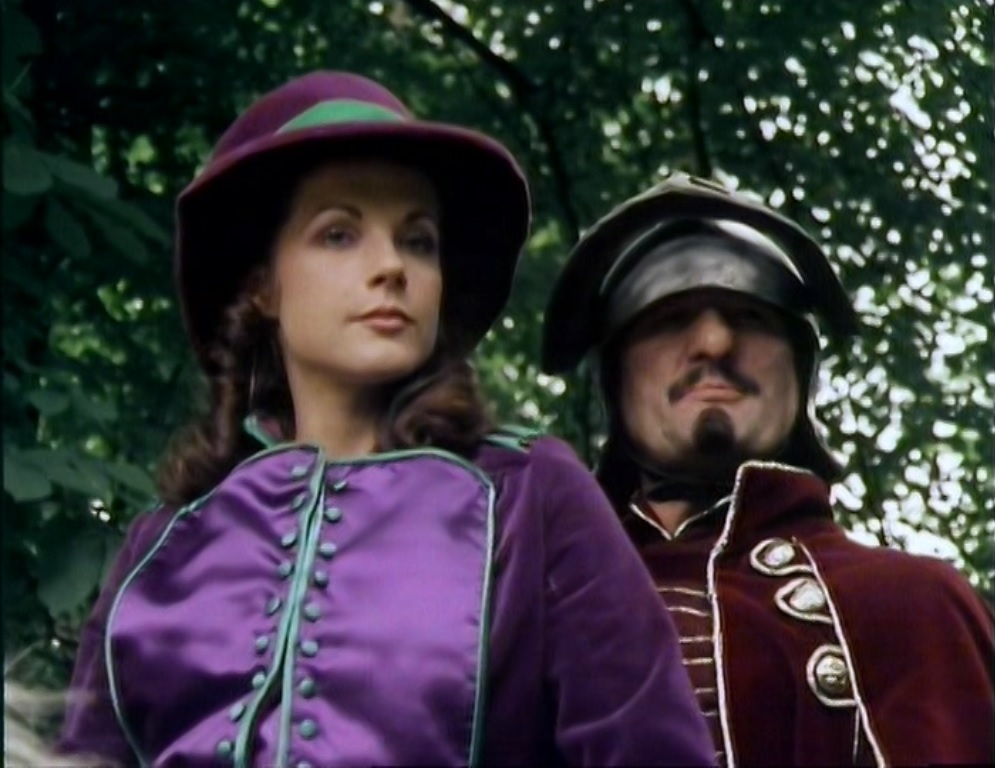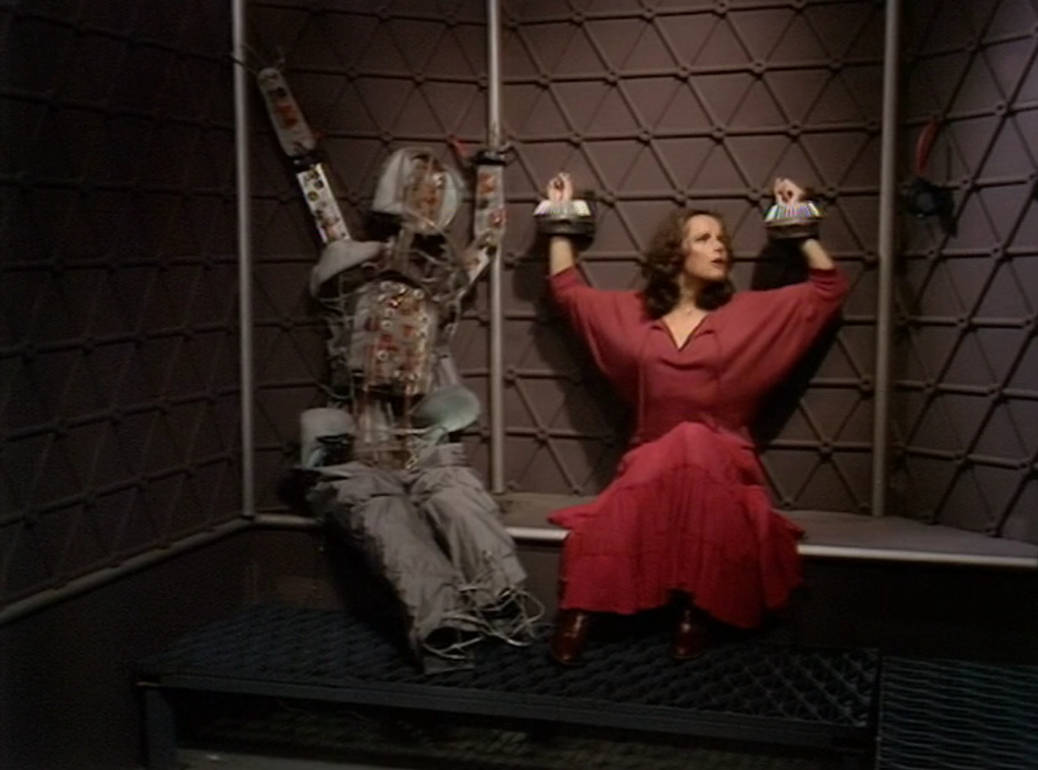Doctor Who Season 16 really was the first of its kind, with a brand new companion, a brand new villain, and an exciting ‘fetch quest’ across space and time.
Producer Graham Williams was still fairly new to the role when he began planning Doctor Who Season 16. He’d joined the year before, overseeing the established TARDIS team of the Fourth Doctor and Leela, along with long-time script editor Robert Holmes.
But change was afoot for Doctor Who Season 16, with Leela having left the Doctor to begin a new life on Gallifrey. Robert Holmes, too, was keen to move on, and was replaced for this series by writer Anthony Read. It was this man who first heard Williams’ proposal for a different kind of Doctor Who season – one linked by a larger plot arc which would see the Doctor embark on an epic journey across the universe. This was a first for Doctor Who, even though previous seasons had consisted of connected stories.
In this case, the link was the Key to Time – an ancient artefact which maintained the equilibrium in the cosmos. But since this artefact was too powerful for any single being to possess, it had been broken into six fragments which had been scattered throughout time and space. It was the Doctor’s job to locate and reunite these six pieces, and each story in Doctor Who Season 16 saw the Time Lord on the tail of a specific segment.

But this wasn’t an adventure the Doctor undertook of his own volition. In the first story of Doctor Who Season 16 – ‘The Ribos Operation’ – the Time Lord is contacted by a mysterious being known as the White Guardian, a benign entity who defends all that is good in the universe. He tasks the Doctor with finding the six segments of the Key to Time to prevent it from falling into the hands of the universe’s deadliest enemy – the Black Guardian, who is on a mission to sow chaos and destruction by gaining complete mastery of time itself.
Of course, no Time Lord can travel without a companion, and in Doctor Who Season 16 the eponymous hero is joined by another of his own race – the Time Lady Romanadvoratrelundar, or Romana if you prefer (or Fred.) Here, she is portrayed by the actor Mary Tamm, who took the role on the understanding that she would be represent a new kind of Doctor Who companion – one who could hold her own and square up to the Doctor, and not simply fall off cliffs and require constant rescuing.
And in many ways, Romana was this very character. She is intellectually superior to the Doctor, having graduated from the Time Lord Academy with a triple First. Moreover, she knows how to pilot the TARDIS, and carries herself with a tremendous air of sophistication and grace.

Certainly, these character traits are reflected in her costume choices. She is not one for dungarees or mini skirts; she typically chooses frocks or dresses, even opting for a classy fake fur number in ‘The Ribos Operation.’ It’s as if the Doctor is travelling with a member of the aristocracy, and Romana’s demeanour and wardrobe choices certainly make for an exciting new companion. Indeed, one could even argue that her outfits make Doctor Who Season 16 look high-budget.
Alas, Romana isn’t given as many chances to shine in Doctor Who Season 16 as one might like, and there are multiple occasions where she finds herself screaming for help as she dangles over ravines, or tied to a stake as over-zealous cult members try to sacrifice her to their god.

But there is much to love in Doctor Who Season 16, and one story in which Romana is particularly well characterised is in ‘The Pirate Planet‘ by new writer Douglas Adams, who was on the cusp of finding fame with The Hitchhiker’s Guide to the Galaxy. In this adventure, she owns virtually every scene she’s in; the moment where she is arrested and taken to the pirates’ headquarters is particularly memorable. She carries herself with such authority and quick wit that one could be tricked into thinking that she is the captor.
Moreover, it is the introduction of Douglas Adams’ writing that really makes Doctor Who Season 16 a stand-out series. Adams’ style is certainly ‘Marmite’ among Doctor Who fans (in that they either love it or hate it!) but there’s no denying its impact. Indeed, it so impressed Graham Williams that he hired Douglas Adams as the script editor for Doctor Who Season 17, and he went on to co-write one of the most popular stories of all time, ‘City of Death.’
And even though Adams’ influence in Doctor Who Season 16 didn’t really extend beyond ‘The Pirate Planet,’ the same air of levity and pithy dialogue ran through this series like a stick of rock. This was a conscious editorial decision; Doctor Who had received some criticism for its portrayal of horror and violence in previous years, and Graham Williams had been instructed by the BBC to dial down the drama and play-up the humour.
And Williams certainly achieved this. Indeed, there is probably no better example than the trial scene in the third episode of ‘The Stones of Blood’ which, depending on your point of view, is either a masterstroke or a complete mockery of Whodom.

Certainly, the impact of these creative decisions was far-reaching. For Graham Williams’ successor John Nathan-Turner, the “undergraduate humour” that typified Doctor Who Season 16 prompted him to do a complete 180 for his first season, and he oversaw some of the darkest and grittiest adventures in the series’ history. Similarly, the final episode of ‘The Armageddon Factor’ (in which the Doctor unites all of the Key’s segments, and then throws them away) inspired Nathan-Turner to devise what he considered to be a more satisfying and conclusive end to his own season-long adventure in 1986 – a decision which caused the instant resignation of his script editor, and the threat of a lawsuit.
But there was much to love in the bold, ambitious Doctor Who Season 16, with such adventures as ‘The Androids of Tara’ and ‘The Stones of Blood’ still standing as sleeper classics in the hall of Doctor Who greats. The programme was 15 years old at this point, and the fact that it was unafraid to try new things was inspiring.
What do you love most about Doctor Who Season 16? And which is your favourite adventure? Let me know in the comments below.
Shop on Amazon
Latest posts
- Amy Pond: Why can’t the Doctor save her?
- Doctor Who: Ranking all of the Auton stories
- 3 problems faced by Doctor Who showrunners
- Doctor Who: Ranking all of the classic Sontaran stories
- Is Doctor Who Season 13 the pinnacle of the Tom Baker era?









MANDRELS: BRING THE ANTI-DRUG MESSAGE TO YOUNG PEOPLE.